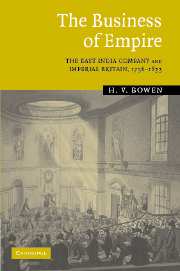Book contents
- Frontmatter
- Contents
- List of figures
- List of tables
- Preface
- Notes on the text
- List of abbreviations and short titles
- 1 Introduction
- 2 Relationships: city, state, and empire
- 3 Relationships: government and the Company
- 4 People: investors in empire
- 5 People: Company men
- 6 Methods: an empire in writing
- 7 Methods: the government of empire
- 8 Methods: the management of trade
- 9 Influences: the Company and the British economy
- Afterword
- Index
3 - Relationships: government and the Company
Published online by Cambridge University Press: 09 July 2009
- Frontmatter
- Contents
- List of figures
- List of tables
- Preface
- Notes on the text
- List of abbreviations and short titles
- 1 Introduction
- 2 Relationships: city, state, and empire
- 3 Relationships: government and the Company
- 4 People: investors in empire
- 5 People: Company men
- 6 Methods: an empire in writing
- 7 Methods: the government of empire
- 8 Methods: the management of trade
- 9 Influences: the Company and the British economy
- Afterword
- Index
Summary
The previous chapter showed how the late eighteenth-century acquisition of an empire in India greatly enhanced the East India Company's importance to the British state and nation. It was widely acknowledged, however, that if Britain was ever fully to benefit from territorial expansion in Asia it was absolutely imperative that the Company be strong, stable, and, above all, well managed. Such institutional qualities had often been evident in the development of the Company in the half-century after 1709, but during the 1760s the initial adjustment to empire proved to be difficult and uncomfortable for those charged with the management of East Indian affairs in Britain. The Company was almost fatally weakened by a series of internal political crises, and this brought sharply into focus the question of whether an independent trading organisation was an appropriate body to administer a valuable territorial empire in India.
This chapter begins by examining institutional failings that were so serious that sustained government attention had to be focused on the Company in Britain as well as India. From 1767 onwards, successive ministerial interventions in Company affairs saw remedies applied to a whole host of domestic ills. These interventions were at first haphazard, and not all of them were successful, but, as is established in the second part of the chapter, they stabilised and regulated the Company, and paved the way for all non-commercial British activities in India to be brought under the supervision of government.
- Type
- Chapter
- Information
- The Business of EmpireThe East India Company and Imperial Britain, 1756–1833, pp. 53 - 83Publisher: Cambridge University PressPrint publication year: 2005

